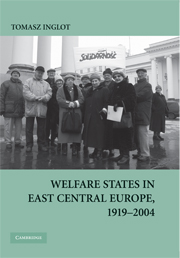Book contents
- Frontmatter
- Contents
- Figures and Tables
- Acknowledgments
- Welfare States in East Central Europe, 1919–2004
- Introduction: Understanding Past and Present Social Policy Development in East Central Europe
- 1 The Welfare State in East Central Europe: A Conceptual and Theoretical Reconsideration
- 2 Institutional Legacies: State Building, Regime Change, and the Development of National Welfare States in Czechoslovakia, Poland, and Hungary, 1919–1989
- 3 Policy Legacies and Welfare States under Communism: Cycles of Social Policy Expansion and Retrenchment in Czechoslovakia, Poland, and Hungary, 1945–1989
- 4 Historical Legacies, Welfare State Institutions, and the Politics of Social Policy Reforms in Postcommunist East Central Europe, 1989–2004
- Conclusion: Postcommunist “Emergency” Welfare States and Theoretical Exploration of Institutional Change and Social Policy Development
- Bibliography
- Index
1 - The Welfare State in East Central Europe: A Conceptual and Theoretical Reconsideration
Published online by Cambridge University Press: 25 July 2009
- Frontmatter
- Contents
- Figures and Tables
- Acknowledgments
- Welfare States in East Central Europe, 1919–2004
- Introduction: Understanding Past and Present Social Policy Development in East Central Europe
- 1 The Welfare State in East Central Europe: A Conceptual and Theoretical Reconsideration
- 2 Institutional Legacies: State Building, Regime Change, and the Development of National Welfare States in Czechoslovakia, Poland, and Hungary, 1919–1989
- 3 Policy Legacies and Welfare States under Communism: Cycles of Social Policy Expansion and Retrenchment in Czechoslovakia, Poland, and Hungary, 1945–1989
- 4 Historical Legacies, Welfare State Institutions, and the Politics of Social Policy Reforms in Postcommunist East Central Europe, 1989–2004
- Conclusion: Postcommunist “Emergency” Welfare States and Theoretical Exploration of Institutional Change and Social Policy Development
- Bibliography
- Index
Summary
The main emphasis of this book, on the “path-dependent” nature of welfare state development in East Central Europe and on the relevant historical legacies, requires a new theoretical framework that would aim to reconcile two seemingly contradictory goals inherent in this kind of contextualized comparative analysis. First, we ought to acknowledge, clarify, and explain similar general characteristics of the Polish, Hungarian, and Czech and Slovak welfare states to determine whether or not a special single type of a discernible social policy regime (Esping-Anderson 1990) did actually emerge in this part of Europe during the twentieth century. Raised in the past by several leading scholars (Rimlinger 1971; Horowitz 1977; Scharf 1981; Castles 1986; Tomka 2004), this question still awaits a more complete and satisfactory answer. Second, we should attempt to account fully for the reasons behind the contemporary diversity of social policy outcomes and reform solutions in the postcommunist world. Such comprehensive investigation could lead us to uncover the key mechanisms of reproduction of each individual welfare state over a long period of time.
In an effort to develop such framework this book engages three different bodies of scholarship: studies of comparative institutional development (and comparative social policy) of industrialized countries, which have mostly excluded Eastern Europe, comparative analyses of communist regimes, which in the past made only a few notable attempts to examine social policies of the Soviet bloc, and the so-called transitions (or democratization) literature, which incorporates various strains of current institutionalist and historical-institutionalist scholarship.
- Type
- Chapter
- Information
- Welfare States in East Central Europe, 1919–2004 , pp. 21 - 53Publisher: Cambridge University PressPrint publication year: 2008



